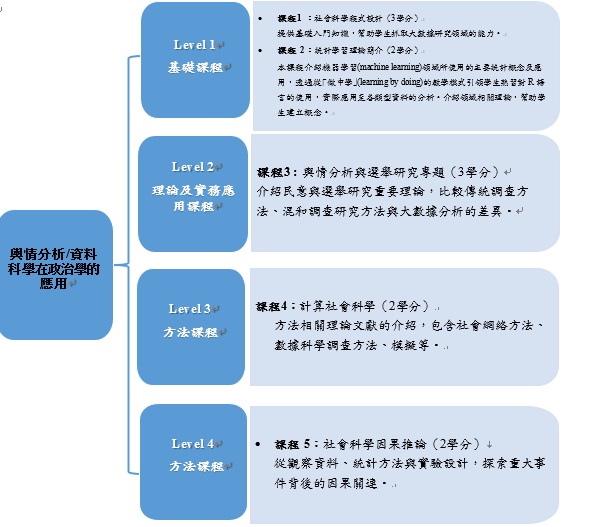Public Opinion Analysis/ Data Science for Political Science
注意
❯
- 領域專長課程可能有先修科目或開放對象之限制,選課前請先到臺大課程網確認。
- 領域專長的施行學期若晚於畢業當學期,學生即使修習專長課程且成績及格,仍無法取得認證。
施行學期:110-1 主責單位:DEPARTMENT OF POLITICAL SCIENCE
基本資訊
主責教師
姓名
email
yutzung@ntu.edu.tw
聯絡窗口
姓名
官凌蕙
email
kuanlh1124@ntu.edu.tw
學習目標
一、學習目標:
● 了解訊息如何在不同媒介上以不同的方式傳播
● 能夠分析並抽取訊息背後可能帶有的意識形態色彩。
● 從資料瞭解民意如何形塑,社群媒介或輿情又如何影響當代的政治傳播或者選舉情勢。
● 具有資訊跨域能力,可應用資訊工具處理政治相關文本如總統講稿、政府機構公告(如國台辦新聞)、社群輿論等。
二、學習效益:
● 擔任輿情分析師:如「社群輿情分析師」、「企業輿情大數據分析師」、「輿情報告開發」等。
● 擔任資料科學家:如「巨量文字探勘分析師」、「數據資料科學家」、「數據應用分析人員」等。
● 攻讀國外計算社會科學碩士學位:未來可逕自至國外相關計算社會科學學程如芝加哥大學的計算社會科學碩士學位等。
課程架構

修課指引
This specialization focuses on applications of public opinion analytics and data science in political science. Students are encouraged—not required—to have basic preparation in political science. Prior completion of “Political Science I & II” (6 credits, departmental core) or “Introduction to Political Science” (2-credit general education) is recommended to ensure fluency with key concepts and debates.<br>Level 1 — Programming for the Social Sciences & An Introduction to Statistical Learning<br>Begin with a practical toolkit. In Programming for the Social Sciences, students learn to operationalize computational methods for political communication and social issues. The emphasis falls on working with text?as?data, network structures, demographic variables, and geographic information—building habits for handling data types commonly encountered in social research and for acquiring large-scale digital traces. In Introduction to Statistical Learning, students adopt a “learn by doing” approach to applied inference. Using R, they practice data wrangling, exploratory analysis, and core estimation techniques, gaining a conceptual grasp of statistical learning while developing reproducible workflows.<br>Level 2 — Special Topics in Public Opinion Analytics and Election Studies<br>Next, students connect theory to measurement. The course introduces major theories of public opinion and voting behavior and surveys research designs used in election studies. From the voter’s perspective, students analyze assumptions about political cognition and the determinants of vote choice, including socioeconomic background, group identification (e.g., party identification, class voting, ethnic attachments), issue orientations, candidate evaluations, social networks, and phenomena such as strategic and split-ticket voting. From the institutional perspective, students examine how electoral rules are designed and how those rules shape party systems, competition, and representation. By the end, students can navigate diverse election datasets and select appropriate methods for answering substantive questions.<br>Level 3 — Computational Social Science<br>Students then broaden their methodological range. This course introduces the core tools and techniques of computational social science and builds them around concrete research questions. Drawing on mathematics, statistics, computer science, and data science, students engage problems in political science, sociology, economics, management, and allied fields. They learn to implement advanced computational approaches—including mathematical modeling, social network analysis, and complexity-informed theories—to study collective behavior, information diffusion, and institutional dynamics at scale.<br>Level 4 — Causal Inference for the Social Sciences<br>Finally, students consolidate their ability to make credible causal claims. Building on experience with large, complex datasets, the course develops strategies for uncovering cause-and-effect relationships using observational data, statistical methods, and experimental designs. Students examine the logic of identification, study designs suited to policy-relevant questions, and the trade-offs among randomized experiments, quasi-experiments, and observational estimators. Through guided applications, they design and implement analyses that move from descriptive patterns to causal explanations for events of substantive and policy significance.
課程資訊  修習課程說明
修習課程說明
 修習課程說明
修習課程說明編號
課程識別碼
課程名稱
學分數
備註
For university-wide matters related to this specialization—such as how it appears on graduation documents—please contact the Center for Teaching and Learning Development, Office of Academic Affairs, at 3366-3367. For questions about coursework or requirements specific to this track, please email the lead instructor at yutzung@ntu.edu.tw and cc the program contact at kuanlh1124@ntu.edu.tw to facilitate a timely reply.
【落日條款】
- 適用對象: 112-1 入學之學生。
- 適用範圍: 112-1 (含) 以前終止之領域專長,詳見首頁最新消息。
【修習課程說明】
- 取得本領域專長認證須修習英語授課之班次
- 英語授課之課程識別碼第 4 碼為 E
 ENG
ENG